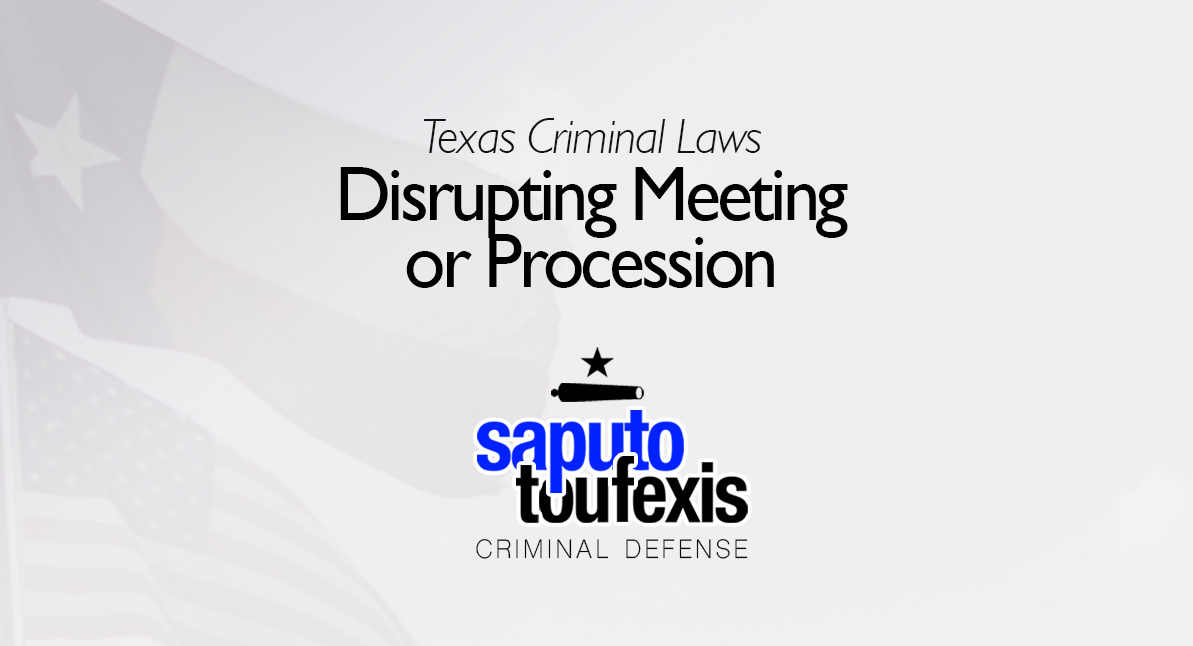The Texas Disrupting Meeting or Procession law gives police the right to arrest you if they believe you tried to prevent or disrupt a lawful meeting or procession by obstructing or interfering with it by physical action or “verbal utterance.”
FAQs about the
Disrupting Meeting or Procession law in Texas
- What is the current Texas law about Disrupting Meeting or Procession?
- How can I be charged with a Disrupting Meeting or Procession offense in Texas?
- What is the statute of limitation for Disrupting Meeting or Procession in Texas?
- What is the penalty for a Texas Disrupting Meeting or Procession offense?
- Can you get probation for Disrupting Meeting or Procession in Texas?
- What level of crime is Disrupting Meeting or Procession in Texas?
The Texas legislature codified this criminal offense in Texas Penal Code Section 36.08. The legislature did not update this law in 2023. In fact, this law has not been amended since 1993.
The Penal Code classifies the Texas Disrupting Meeting or Procession law under Title 9 “Offenses Against Public Order and Decency,” Chapter 42 “Disorderly Conduct and Related Offenses.” Learn more about the Texas offense of Disrupting Meeting or Procession below.
What is the current Texas law about Disrupting Meeting or Procession?
Texas law currently defines the offense of Disrupting Meeting or Procession in Penal Code Section §42.05 as follows:[1]
(a) A person commits an offense if, with intent to prevent or disrupt a lawful meeting, procession, or gathering, he obstructs or interferes with the meeting, procession, or gathering by physical action or verbal utterance.
How can I be charged with a Disrupting Meeting or Procession offense in Texas?
You can be charged with Disrupting Meeting or Procession in Texas if the state’s attorneys believe that each of the elements of 42.05(a) as described in the section above have been met.
What is the statute of limitation for Disrupting Meeting or Procession in Texas?
As a misdemeanor, Disrupting Meeting or Procession charges have a two-year limitations period.[2]
What is the penalty for a Texas Disrupting Meeting or Procession offense?
A conviction for Disrupting Meeting or Procession in Texas is punished as a Class B misdemeanor,[3] with a maximum possible fine of up to $2,000 and jail time of up to 180 days.
Can you get probation for Disrupting Meeting or Procession in Texas?
The Texas Code of Criminal Procedure allows both judges and juries to grant probation for Disrupting Meeting or Procession, and judges are also allowed to accept deferred adjudication plea deals.[4]
Note, however, that judges may not grant community supervision after a conviction if (1) the defendant used or exhibited a deadly weapon during the commission of the felony or immediate flight thereafter and (2) the defendant used or exhibited the deadly weapon himself or was a party to the offense and knew that a deadly weapon would be used or exhibited.[5]
What level of crime is Disrupting Meeting or Procession in Texas?
The Penal Code classifies Disrupting Meeting or Procession as a Class B misdemeanor.
Learn more about the penalty range for this offense in the section above.
Legal References:
^1. Texas Penal Code §42.05. This law is current as of 2024.^2. See Code of Criminal Procedure 12.02(a)^3. Texas Penal Code §42.05(b)^4. See Chapter 42, Texas Code of Criminal Procedure, Art. 42A.054, Art. 42A.056, Art. 42A.102^5. Art. 42A.054(b), Texas Code of Criminal Procedure










